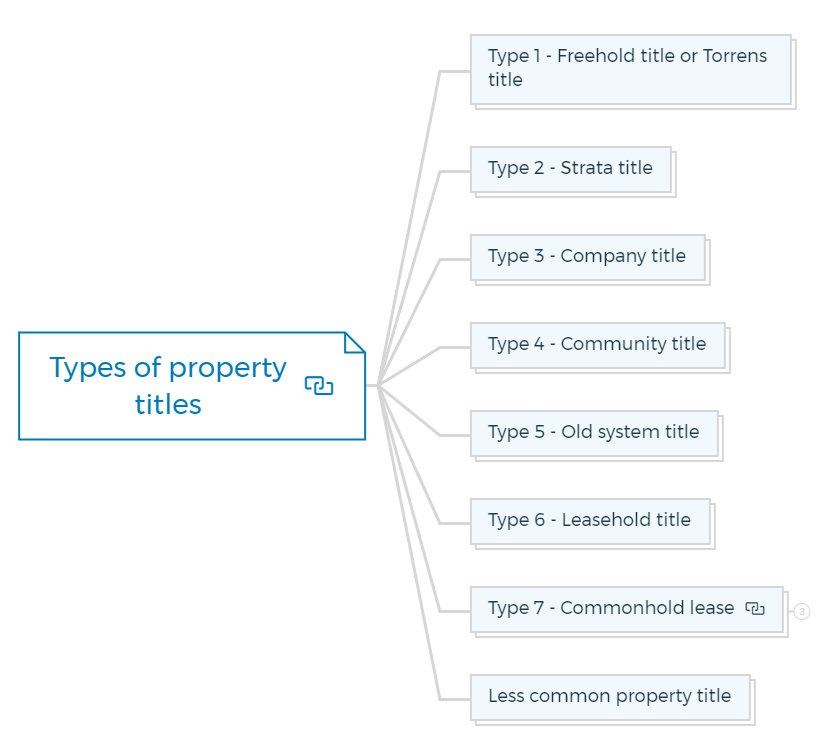Property Title - The 7 Different types of property ownership in Australia
When it comes to property, there are a few different types of real estate ownership. You may own the property outright or have a leasehold estate or a freehold estate.
This blog post will take you through the different property titles and what that means for you as the owner.
If you are considering investing in property, it is essential to understand the different types of property title arrangements so you can make an informed decision!
Even though you haven’t chosen a property yet, you will understand the kind of property that the neighbourhood’s demographics need. You likely already know whether you’re searching for a home, an apartment, or something a little more specialised.
You should know the duties associated with each type of property title and how they may affect you as an investment.
Though property title arrangements are a state-specific law topic, you should note that property titles are generally consistent from state to state.
What is a Property Title?
A property title is a legal document that proves you are the owner of a piece of property. The title includes your name and the address of the property. It may also include other information, such as any restrictions on how you can use the property. The title deed is the physical document that proves you own the property.
You are missing out if you haven’t yet subscribed to our YouTube channel.
What are the different types of property titles?
Type 1 - Freehold title or Torrens title
Freehold title means you own the property outright and do not have to renew a lease. You will also not have to pay ground rent.
This type of ownership gives you more control over what you can do with your property, as there are no restrictions from a landlord.
The most typical type of title in real estate, the freehold, assures the owner of a clear title. As a result, after you purchase the property, you may be sure that nobody will challenge your title ownership.
A freehold title or Torrens title will cover everything inside the property’s limits. Still, there may also be “easements”—rights of way for authorities like the water and electricity boards to pass through your property if necessary. It is illegal for you to deny people access to these easements.
You do not owe any levies to other individuals because a freehold title does not share any joint property. However, you will be required to pay rates based on the land’s market value, and you might also be required to pay land tax if the land worth exceeds the state’s cap for tax-free purchases.
Type 2 - Strata Title
Strata titles apply to properties such as serviced apartments, flats, villas, senior housing communities, and hotels.
It also includes car parking spaces and potentially a storage facility in your strata title. Strata titles were developed to acknowledge that some areas will be shared by everybody and require money for maintenance.
By law, every owner must be awarded membership in an owners’ company, also known as a corporate body.
The corporate elected office bearers of the body typically consist of a Chair, a Secretary, and a Treasurer to maintain the balance of the books.
Every owner pays a tax for the upkeep of the communal spaces. This levy consists of two components: a sinking fund contribution and a strata levy, which cover the costs of maintaining the shared facilities daily and substantial improvements to things like roofs, walkways, and swimming pools, respectively.
Your contribution depends on your unit’s size, not its age.
Check the sinking fund’s balance if you plan to purchase a property with a strata title to ensure it is in good shape.
The more money required, the older the property. When purchasing a house, it is not unusual to be requested to donate a sizable sum six months later to pay for significant repairs that the sinking fund cannot cover.
You must request that your conveyancer conduct a specific corporate search to review the corporate body records. Such a search would cost about $300.
You’ll want to know how much your contribution will be and the sum of the donations made each quarter. Some estates have grilling areas, tennis courts, swimming pools, and gyms, which results in expensive body corporate costs.
If you have not planned for them, fees as high as $1,000 a quarter are not uncommon and can affect your cash flows.
Of course, you can deduct corporate body expenses from your taxes, but you only be reimbursed to the extent of your marginal tax rate.
Type 3 - Company Title
Company title is when you own the property through a company. The company may be a private company, cooperative, or other type of organisation.
With company title ownership, you do not own the property outright. Instead, you own shares in the company that owns the property. You may have voting rights and other privileges as a shareholder, but you will not have the same rights as someone who owns the property outright.
Rarely is the original structure owned under a corporation name. You have no ownership interest in the property title under this arrangement. Instead, you are a shareholder in the business that is the property’s owner.
There is common property to maintain, so there will typically be a charge to pay. Although not very common, company titles do exist. Since there is no title to the property, banks often won’t lend to you for such a transaction because they can’t take a mortgage on the property.
Property Development “How To’s” & Frequently Asked Questions
Includes 5 x detailed eBooks [142 pages]
✓ How To Become A Property Developer? In 10 Easy Steps (51 Pages)
✓ How To Overcome Fear In Property Development? (15 Pages)
✓ How To Become A Real Estate Developer? Without Experience (37 Pages)
✓ Property Developer FAQs – Who, What, When, How? (20 Pages)
✓ How To Become A Real Estate Millionaire In 10 Steps? (19 Pages)
Type 4 - Community Title
Community title is when you own a property with other people. With community title, you own your unit outright, but you also share ownership of common areas with the other owners in the community.
This type of ownership is common in condominiums and townhouses.
Community title, which has only been around since 1989, is comparable to strata title. The distinction is that a community title is frequently used to describe a significant land subdivision where shared spaces are made available for homeowners’ use.
The property owners can access playgrounds, parks, and other amenities while maintaining ownership of their often freestanding homes.
There is no common property like there is in a strata title, but there is shared property, so there will usually be a levy of some kind.
Type 5 - Old System Title
Old system title is the most common type of property ownership in Australia. With this type of title, you own the property outright, and there are no restrictions on how you can use it.
The property’s title deed will list any easements or encumbrances, like a neighbour’s right of way.
Only a tiny fraction of properties are still listed under the “old system” title. These property titles are challenging to track because there is no apparent ownership history.
Rarely the original owner of such a property could be questioned, so if you want to buy one with a title like this, make sure to get good legal advice.
Type 6 - Leasehold Title
A leasehold title is when you own the property for a set period, typically 99 or 999 years. At the end of the lease, the property reverts to the owner of the lease (the landlord).
A leasehold title is a property ownership structure where the owner of a property (the “lessor”) leases it to another person (the “lessee”) for a set amount of time. The lessee has exclusive use of the property during the lease term and typically has the right to renew the lease at the end of each term.
Leasehold titles are most commonly used for residential properties, although you can also use them for commercial properties.
Under a leasehold title arrangement, the lessor retains ownership of the property (and all associated rights and liabilities). At the same time, the lessee gains exclusive use and control over it for the duration of the lease.
With a leasehold title, you do not own the property outright, and you will need to renew your lease when it expires. You may also be required to pay ground rent to the landlord.
Type 7 - Commonhold lease
Commonhold lease is a new type of property ownership available in some states. The commonhold association owns the common areas, and all the owners share in the upkeep and maintenance of the property.
Commonhold is a new property title introduced in England and Wales in 2004. It was designed to offer an alternative to leasehold ownership, which has a number of disadvantages.
The key benefits of commonhold are that it gives each owner a share in the management company which owns the land on which the property is built and that it makes it much easier to sell or mortgage your property.
Commonhold also has several other advantages, including:
The end-of-ground rents
With commonholds, you don’t have to pay ground rent to the landlord.
No need for permission to make changes
You don’t need permission from the landlord to make improvements or changes to your property, as long as they comply with the rules set out in the commonhold community statement.
Flexibility in selling your property
With commonhold, you can sell your property without the permission of the other owners in the building.
Less Common Property Title
Each state may contain uncommon or out-of-date titles that you have never heard of, including “pastoral title” or “native title.”
If you come across any of these, get counsel from your conveyancer or attorney before moving forward.
It is crucial to understand the title deeds of a property before moving forward since it will provide you with a list of questions to make to the selling agent, including:
- Do you and your neighbors still have any unresolved fencing issues?
- Do you have any knowledge of any easements on the land?
- What are the community title contributions and corporate body levies?
- How are the common areas maintained?
- Does the owners’ corporation currently have any conflicts?
- Can this freehold property be divided? (Ask this if you’ve discovered a sizable block that you might want to develop in the future.)
- Can I convert this house to two occupancies? (Or, add a second home without splitting it.)
- Does this title have any active covenants? (That is, limitations on what can be erected, the color of the roof, and other things.)
- Does this title have any caveats (sale restrictions)?
Again, the property agent might not be familiar with these responses, so email a list and request that they respond to you within a day or two.
So, there you have it! A quick overview of the different types of property title. If you are considering buying property, do your research and understand the type of title that is right for you!
Enroll on property mastermind course and uncover secret frameworks of property development.
FAQs
What would happen if I changed my type of property title?
There are a few things that could happen if you changed your type of property title. For one, the government could seize your property for not adhering to the correct title type.
Additionally, if you have a loan on your property, the lender may insist that you switch back to the original title in order to continue receiving mortgage payments.
Finally, if you decide to sell your property after switching titles, it may be more difficult to find a buyer who is comfortable with the change.
What is a Torrens title?
A Torrens title is a type of land ownership where the ownership of a parcel of land is registered on a public register, and title to the property can be transferred easily and cheaply.
The Torrens title system was created in South Australia in 1858, and it has now been adopted in over 40 countries around the world.
The key advantage of the Torrens title system is that it provides an indisputable record of ownership, which helps to reduce fraud and disputes over property ownership.
What is the difference between ownership and title?
There’s a big difference between ownership and title. Ownership is having full control and dominion over something, while title is simply having a document that says you are the owner.
So, for example, if you buy a car, you become the owner of the car, but you may not have the title to it (i.e., the document that proves you are the owner). Similarly, if someone gives you their car as a gift, you become the owner of the car but may not have the title to it.






